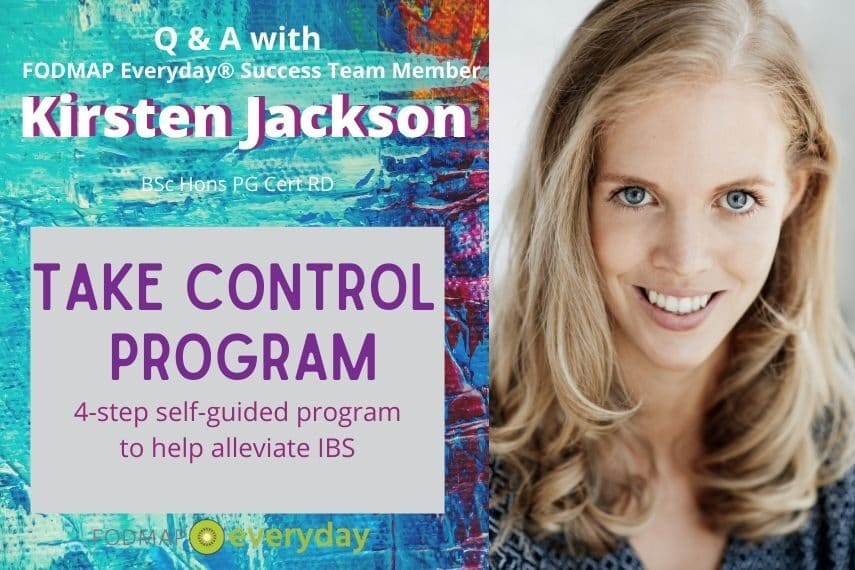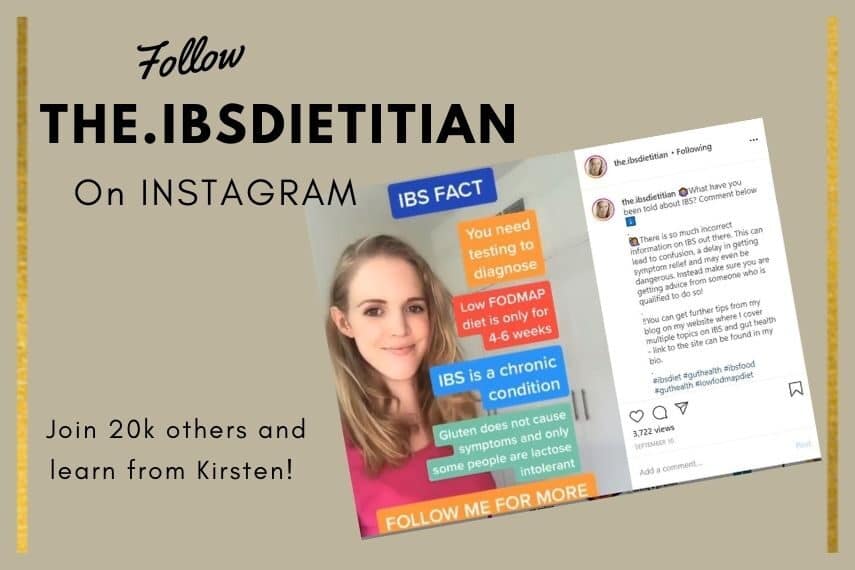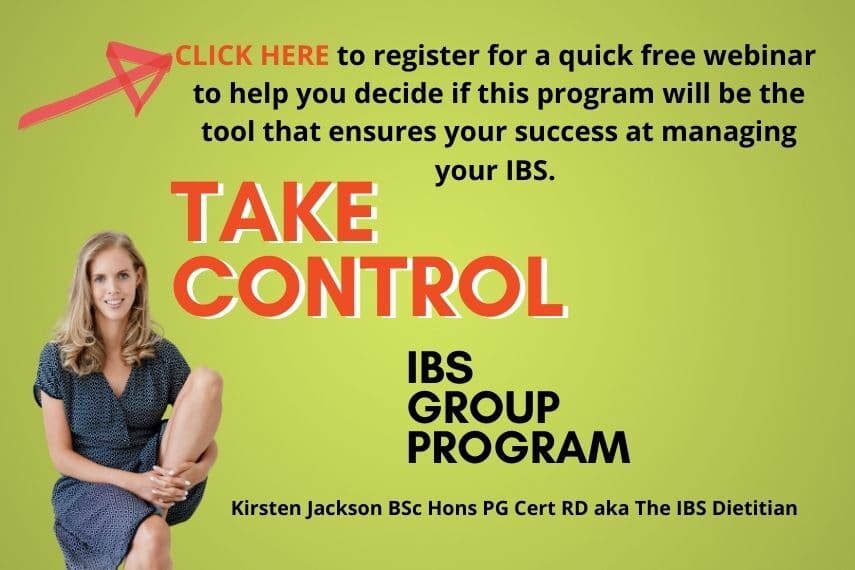Kirsten Jackson BSc Hons PG Cert RD is joining the FODMAP Everyday® Success Team and we are thrilled to be introducing her. Or, maybe she looks familiar? Kirsten is a whiz at short-form video and perhaps you have caught her on her Instagram page: @the.ibsdietitian. Who else can educate about IBS while dancing to Ciara’s Level Up?

Meet Kirsten
Kirsten is a UK consultant gastroenterology dietitian currently living in Dubai. She started her business, The Food Treatment Clinic, in 2014 and now consults online with people from all over the world. You will find her at thefoodtreatmentclinic.com
She graduated from The University of Hertfordshire in England in 2012 and then went on to a post-graduate certificate in Advanced Dietetics at The University of Nottingham, and also Advanced FODMAP Training from Kings College University in London.
Kirsten first became interested in gut health after suffering with both IBS and celiac disease herself. Kirsten sat down with us to get the ball rolling.
Dédé Wilson: Kirsten, we are so excited to have you on-board. Folks will be able to read your first article for us on Periods & IBS, which I know will be welcomed by many, but let us start at the beginning. Tell us a bit about your personal experience with GI issues and when you were introduced to the low FODMAP diet.
Kirsten Jackson: The diet first came ‘into my life’ around 1 year after qualifying as a dietitian. It hadn’t really been that well known about in the UK at that point and it wasn’t something we had covered in the undergraduate degree.
I then started using it when working in gastroenterology in the UK National Health Service after shadowing another more senior dietitian. This was later followed up with formal training at Kings College London.
Tell us about your early personal experiences with the diet.
As part of the Kings College training you have to trial the diet out for yourself. I had 2 realizations…1) That this wasn’t as easy as it looked and I needed to be providing more practical information for clients and 2) I couldn’t believe how much better I felt!
At the time, I didn’t realize I had celiac disease and this is a mistake many people make. They skip the formal diagnosis and think they have IBS, when actually they have celiac disease, which is managed differently.

I am so glad you brought up this point. You are very active on social media, as are we, and while it is a great way to get the word out about the existence of the diet, it is also not the greatest medium for getting across the nuances and complexities of what we are dealing with – and it all starts with a proper diagnosis.
We have dozens of folks joining our community every week and many are self-diagnosing. Sometimes we even see people who have seen a GI, but the doctor has not done a very thorough screening.
We are huge proponents of recommending Registered Dietitians as we find that it is you all who are making the biggest difference for those suffering with GI complaints.
Yes absolutely! I was lucky enough to have gone on to reintroduce gluten and was able to get a proper celiac diagnosis.
However, if I hadn’t had this knowledge as a dietitian I could have just presumed it was a wheat intolerance and continued to eat small bits of gluten. This could have resulted in some pretty serious health complications!
So after being diagnosed with celiac disease my symptoms didn’t quite settle and were exacerbated by stress. After checking that this wasn’t due to gluten, I was told I had IBS. This is when the low FODMAP diet really helped me!
I went from constant fatigue and looking 6 months pregnant to being full of life again. The best part is, I only need to avoid the foods which the diet pin-pointed as being an issue.
Could you elaborate a bit on that? For instance, I had been working as a pastry chef and baker for about 10 years when my gluten intolerance reared its head. It ended up being a blend of gluten and fructan issues, but my point is that I think it was spurred on by my 7-day a week/10-year constant and high exposure to flour, literally by eating it daily and breathing it in.
Folks always want to know “why” they “got IBS” and we all come to it from many different paths. Tell us about why you think it was the gut disruption and stress for you.
Gluten only causes an issue for those with celiac disease or a gluten allergy. People get confused because their symptoms seem better on a gluten-free diet despite not having these issues. This is because by avoiding gluten they are also avoiding fructans which are FODMAPs found in mostly the same foods.
The sad thing is that people who have symptoms with fructans only have an intolerance which means they can have small amounts in their diet. Compare this with someone who reacts to gluten due to celiac who cannot have a single grain.
So, people end up on an unnecessarily restricted diet.
In terms of what causes IBS, we don’t know for sure yet. However, anything which seems to disrupt the gut seems to have a role e.g. stomach bugs, stress and antibiotics. So it makes sense that years of inflammation prior to celiac diagnosis would do this also.
Was the low FODMAP diet a turning point for you in helping your clients?
Yes! When I first qualified we didn’t have the low FODMAP diet and clients would come back time and time again as you tried in vain to get some relief with different fiber types. It was useless!
The low FODMAP diet pin-points specific triggers so the client can manage their symptoms long term (minus the restrictive diet).
So well said! I think there are a couple of things that people miss. Firstly, that the diet can pin-point specific triggers, as you said, but only if the diet is approached methodically – and we find that this is usually best accomplished when working with a RD. Secondly, you say, “minus the restrictive diet” and this is so important!
One of my pet peeves is when people, even MDs, talk about the “low FODMAP diet” when what they are really talking about is just the Elimination Phase. Our goal is to get folks through their Challenge Phase and onto Integration so that they can eat as broadly as possible, without triggering symptoms, for their optimum gut health. And so that they can eat delicious foods and enjoy life again.
We know that you work with IBS sufferers all over the world. Do you see some consistencies to what is holding people back from gaining control of their symptoms?
Absolutely! The main issue I am seeing is that people are so overwhelmed with all the information on social media and from their doctor that they don’t know where to start. Or they feel they have ‘tried everything.’
The real problem is that no one has guided them through a step by step approach.
We are banging the same drum, for sure! Here in the U.S. working with a RD is often an out-of-pocket expense, and we are mindful of that burden. At the same time, we see people running around in circles, like you say, spending time and money on supplements and other diets that do not get them to their goal.
I always like to point out that even if it is an out-of-pocket expense that for many it can be just a few visits and those can make the difference between success and still being stuck.
This is a perfect segue to talk about what you offer clients, which can be accessed from anywhere in the world. You offer a Take Control program that offers a 4-step self-guided program to help alleviate IBS. Tell us about the program – how it works, the cost and the features.
The program provides scientifically proven advice but in a very step by step, easy to follow format.
It is multi-factorial just like IBS! So, yes, we look at the low FODMAP process, but we also look at other dietary factors, mental wellbeing, sleep and movement. This means that not only are people able to pin-point their triggers, they can also reduce their gut sensitivity.
The format of the program is a combination of short video tutorials, worksheets and downloads that people can go through at their own pace.
They then have access to the private Facebook community group where I do live group Q and As weekly.
The cost is $39 a month rolling (i.e. you can cancel at any time). The average time it takes to complete is around 2-3 months.
If you want to learn more about the program there is a short free webinar you can sign up for!

And then there is a VIP program as well. How does that differ?
The VIP program is a 3-month package working with myself on a 1:1 basis.
This includes;
- Monthly 60-minute consultations
- Monthly written reports
- Weekly email reviews
This is $414/310GBP a month.
There are IBS sufferers all over the globe who feel as though they cannot access help due to their location. You have come up with some truly helpful solutions.
So many people reading this will still be trying to figure out how to get better. What are your three most important tips for people struggling with IBS?
My 3 Most Important Tips:
- Get an accurate diagnosis from a qualified professional.
Without having the correct testing done you may be masking another diagnosis and could be putting your health at risk. The tests required are:
Full blood count
Celiac screen
Fecal calprotectin (IBD marker) - Work with a Registered Dietitian.
This may sound biased, but a dietitian is the only healthcare professional who is trained in medical nutrition. Things like the low FODMAP diet may seem simple on the outset but actually it is very complicated and you need guidance to provide clarity. This is why all medical guidelines state you need dietitian support.
- Start tracking your symptoms.
You will be keen to dive straight into making changes but hit the pause button and track your symptoms, food, sleep and lifestyle for a week or two. This can provide so much insight into what is causing your issues. You can then make small changes which are much more specific.
You work as an Expert Advisor for the IBS Network. Tell us about that organization.
The IBS Network is the largest charity for people with IBS. It provides information, discounts, events and support for people with IBS. Within the UK, they even run in-person local support groups.
Wow, we need the equivalent here in the U.S. Why do you think there is such a high awareness of the need for this in the UK?
It is hard to say as IBS is a global problem.
It may well be related to the way our health system is, in that it is government funded and therefore there is a huge emphasis on saving money. So there is a drive and mindset to empower patients to look after their own chronic health problems where they can do so.
Kirsten, you are such a fantastic addition to our team, and we look forward to your articles and videos.
Read Kirsten’s professional bio here.







